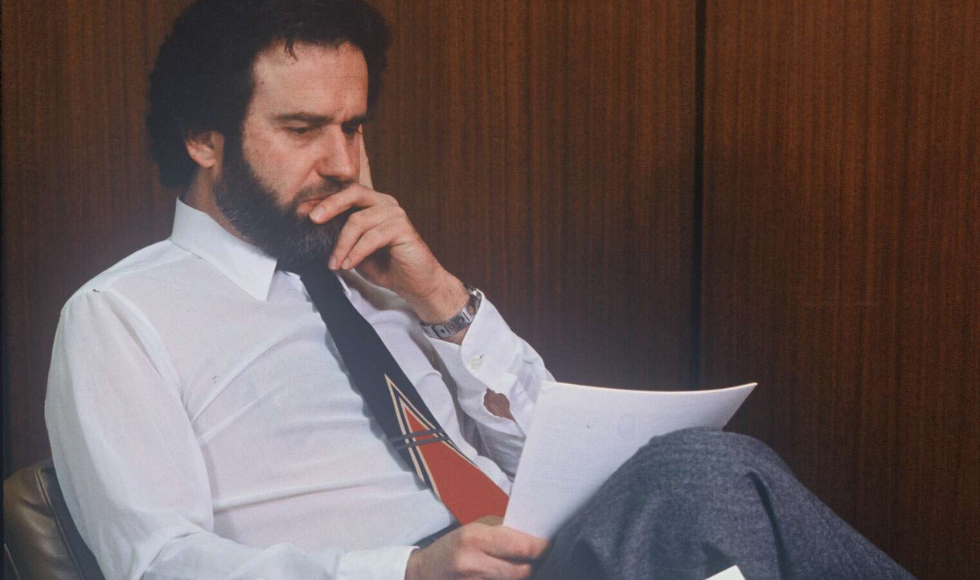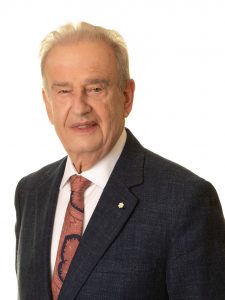Former Dean of Engineering John Bandler lit the way for student innovation and success

John Bandler was the Dean of Engineering from 1979 to 1981.
John Bandler was a world-renowned inventor, engineer, researcher and teacher whose service and support over 50 years put Canada at the forefront of microwave technology, and was a pillar of McMaster and its Faculty of Engineering. He died on September 28 at the age of 81.
Bandler joined McMaster’s department of electrical and computer engineering as a professor in 1969 and went on to become Dean of Engineering from 1979 to 1981, and Professor Emeritus in 2000.
He is perhaps most widely known for pioneering “space mapping” technology, which is now used across the entire spectrum of engineering.

But at McMaster he was beloved for his involvement in coaching its Three Minute Thesis (3MT®) competition, in which graduate students are required to present their research and its wider impact in three minutes or less to a panel of non-specialist judges.
Over the years, hundreds of McMaster students benefited from his mentorship and generosity.
“It’s difficult to think about the Faculty of Engineering without thinking of John Bandler,” said Heather Sheardown, Dean of Engineering. “He was a trusted teacher, advisor and friend to McMaster, and his innovations truly transformed engineering design optimization.”
The son of Jewish refugees from Vienna, Bandler grew up in Cyprus and completed his schooling in the United Kingdom, where he graduated from the University of London with First Class Honours in electrical engineering in 1963.
He came to Canada in 1967 to complete a postdoctoral fellowship at the University of Manitoba before making his way to Ontario and McMaster two years later.
While at McMaster, Bandler coordinated the Group on Simulation, Optimization and Control and the Simulation Optimization Systems Research Laboratory. He also established Optimization Systems Associates Inc. (OSA), which was acquired by Hewlett-Packard in 1997.
His award-winning research revolutionized the engineering and computer-assisted design of microwave circuitry, and his practical application of space mapping and optimization theories resulted in more than 500 publications and significant reductions in the development costs of a wide array of electronic systems.
Bandler also mentored numerous highly successful students, including Professor Mohamed Bakr, now chair of the electrical and computer engineering.
“My relationship with John goes back to 1993 when I was doing my master’s in Egypt under the supervision of another student of his. He jokingly referred to me as his ‘scientific grandson’ because I was a student of a former student,” said Bakr.
“He helped me through a tough transition to Canada during my first two years of my PhD under his supervision,” he said. “Our work resulted in several highly cited publications, and I still use the skill set I learned under his supervision today.”
Bandler’s accolades are plenty. He is a fellow of several engineering societies, including the Royal Society of Canada, and the recipient of multiple awards for his contributions to the field of microwave theory and techniques, such as the IEEE Canada McNaughton Gold Medal and the Queen Elizabeth II Diamond Jubilee Medal. In 2016, he was appointed Officer of the Order of Canada for scientific contributions that have helped position Canada at the forefront of microwave engineering.
In his later years, Bandler turned his attention to creative writing and literary and theatrical workshops, productions and initiatives, but he also continued to share his passion for electrical and computer engineering with McMaster through mentorship and speaking engagements.
Bandler recently accepted the Exceptional Service Award at the Faculty of Engineering’s Applause and Accolades ceremony to recognize his lifetime of achievements.
At the ceremony, he spoke of the importance of believing in something greater than ourselves. A man truly ahead of his time, he knew that the path to success is often not a solo one, and that collaboration is key to innovation.

